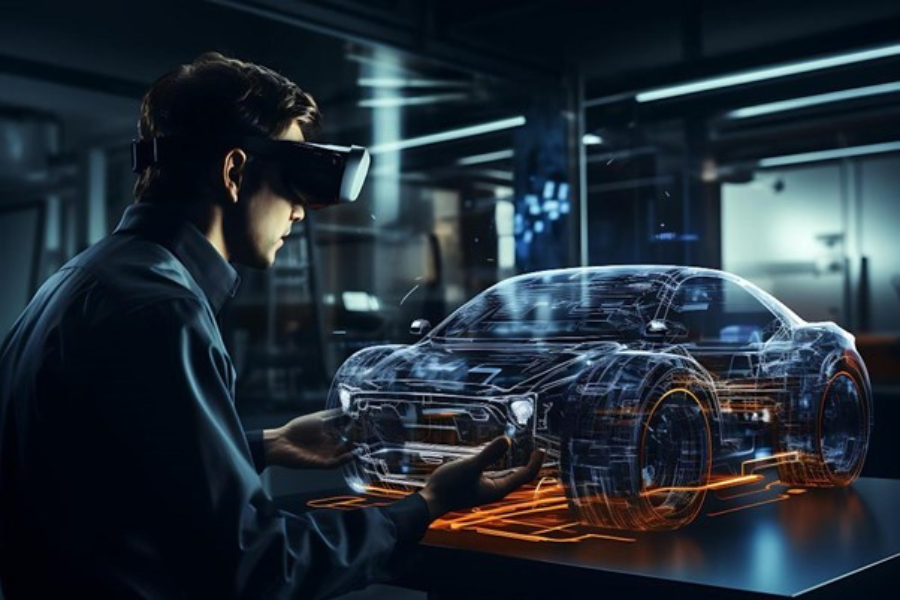There always has been a strong connection between technology and the automotive sector. In the last few years, generative artificial intelligence has emerged a leading player in the automotive market. It has revolutionized the way cars were designed, made, tested, and manufactured.
The automotive experts claim that GenAI will drive unexampled levels of innovation, efficiency, and safety. Statista reports that the global automotive market is likely to touch a value of $74.5 bn by the end of the decade. This shows the importance of generative AI in the automotive industry.
Therefore, in this article, we’ve provided a detailed overview of Gen AI in the automotive industry. We have explained various generative AI use cases, challenges, as well as opportunities. So, let’s start reading!
Generative AI in the Automotive Industry
Generative AI has reinvented vehicle technology and user driving experiences. Using ML algorithms and advanced data analytics, this top-notch technology has ensured autonomous driving and improved the overall safety of the vehicle.
GenAI-supported latest features like lane departure warnings, automated parking systems, and adaptive cruise control have redefined the industry. NLP has allowed voice-supported infotainment systems. Predictive maintenance has optimized the overall vehicle health.
Generative AI services have improved the manufacturing mechanism and supply chain management. Moreover, AI enhances supply chain management and manufacturing processes.
Generative AI Use Cases in the Automotive Industry
The following are the leading areas where generative is used the most:
- AI in Manufacturing
- Quality Control
- Autonomous Vehicles
- Personalized Customer Experience
- Supply Chain Optimization
AI in Manufacturing
You know that there is a huge dependence of the automotive industry on manufacturing. This is one of the few industries where a small error in manufacturing becomes a cause of serious problems.
But thanks to high-rated generative AI services! GenAI hasn’t only made the car making process better, but it has also made it more innovative and efficient.
For example, labor manually picks the car parts from conveyor belts. This is not a productive way and it is also time-consuming. GenAI’s introduction has enabled robots to pick parts with great speed. Now, this practice of picking parts doesn’t require human intervention. Moreover, AI robots alert teams when there is any unexpected error in a machine to prevent serious mishaps in manufacturing.
Autonomous Vehicles
The PwC report claims that driverless vehicles are likely to account for 40% of the miles driven in Europe. The leading automobile manufacturers are Ford and Tesla.
They have introduced many autonomous vehicle’s features. And you know that a big percentage of people are satisfied with the working of autonomous vehicles. This modern technology would be a reality in the upcoming years.
Personalized Customer Experience
Every person looks for a personalized customer experience when they buy cars for them. With generative artificial intelligence, it’s a reality now.
GenAI algorithms can formulate customized recommendations for car features and maintenance schedules by analyzing previous purchases, communication features, and people’s driving habits. This helps automotive companies manufacture personalized vehicles for their customers.
Moreover, Generative AI chatbots provide vehicle owners with 24/7 support. They instantly answer people’s queries and guide them through vehicle buying, maintenance, or troubleshooting problems.
Quality Control
The top concern of automobile owners is to maintain vehicle quality. They want to maintain a higher customer acquisition and retention percentage. However, manual inspection of vehicles doesn’t always provide 100% defect detection results. Manual vehicle inspection also has slower issue resolution.
However, a collaboration with a high-rated generative AI services company can help manufacturers even detect minor defects in the vehicle. Whether it’s an early or last stage of manufacturing, generative AI can detect every potential issue at all stages. It alerts the teams to sort out the issue before it gets worse.
Supply Chain Optimization
Generative AI technology can analyze customer data regarding production processes, logistics, suppliers, and inventory to optimize the efficiency of supply chain management. Today, engineers of top automotive firms leverage GenAI algorithms for conversational planning and designing.
This reduces lead times and resultantly makes product innovative and optimizes inventory management. In addition to this, generative artificial intelligence also makes it easier to iteratively visualize new process models.
Generative AI in Automotive: 2 Top Challenges
Incorporating generative AI systems into today’s vehicles is not an easy task. It requires technical knowledge and careful attention. Today, there is a lot of reliance on data-supported features in vehicles, so close attention to data privacy and security is extremely important.
The demand for AI-supported vehicles is increasing, so it is crucial to carefully consider international regulations and standards regarding data protection, environmental impact and safety.
- The top challenge for Original Equipment Manufacturers is that it lacks standardization in their software-supported vehicles. This can make the technology integration process complicated. It is because there are such universal protocols regarding these processes.
- Another significant challenge is internal transformation. OEMs will need to boost their vehicles’ internal abilities and tech infrastructure to get full generative AI benefits in the automotive industry.
Ready for the Next Generation of the Automotive Industry?
GenAI is the future of the automotive industry. The technology will improve road safety and provide people with fully personalized driving experiences. The generative AI value in the vehicle industry will likely be $2+ billion by 2032.
So, this ML explosion and intelligent insights are gaining pace. Safety and driving convenience are the two priorities. Generative AI services will make the automotive industry sustainable. Moreover, more GenAI-supported vehicles will be on the roads in the near future.
Stay in touch to get more updates & news on Timesanalysis!



